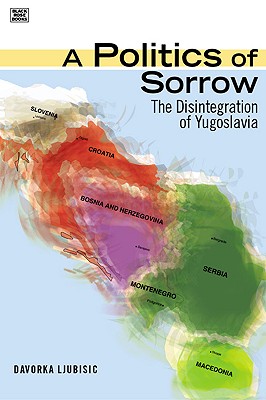A Politics of Sorrow: The Disintegration of Yugoslavia

A Politics of Sorrow: The Disintegration of Yugoslavia
"There is no greater sorrow on earth than the loss of one's native land." --Euripides The Yugoslav tragedy is a story about crimes committed with extraordinary boldness and deception, propagated by the politicians and by the media from both inside, and outside, the former Yugoslavia. This mixture, at the heart of the conflict, provoked the greatest humanitarian catastrophe in Europe since World War II. Written in memory to a lost homeland, to the people who died, and to the people who survived--especially the refugees, displaced internally or dispersed throughout the world--this book is a powerful commentary on war itself that provides insight into the roles that history, ethnic nationalism, and religious differences can play in modern conflict. "A finely crafted historical dialectics that refuses to give into dualist explanations about 'the crimes' and eventually the death of the former Republic of Yugoslavia, as resulting from either 'bad' primordial ancient hatreds and ethnic nationalism, or from the lack of some civic nationalism in the form of 'good' but artificially constructed communities. The author follows Hannah Arendt in charting the history of a long century of 'statelessness, rightlessness and homelessness' in the region brought on by externally imposed balkanization. Every step of the way we are warned against those who preach the purity of ethnos over demos, or conversely, those who seek the bureaucratic disconnection of ethnos from demos as an ideal solution." --Greg M. Nielsen, Concordia University, author of The Norms of Answerability: Social Theory Between Bakhtin and Habermas "The strength of Ljubisic's work is the seamless way it moves from one level to another, first analyzing events in the former Yugoslavia at the level of state politics, then shifting to a discussion of the international context, and finally, and most importantly, describing the impacts of these events at the individual level. In the process, she provides a comprehensive analysis of these confusing events and a much needed contribution to the literature. This is essential reading for anyone who wishes to understand the recent history of the Balkan region." --Neil Gerlach, Carelton University, author of The Genetic Imaginary: DNA in the Canadian Criminal Justice System Table of Contents INTRODUCTION CHAPTER ONE: Theories of the Nation and Nationalism Nationalism and Multiculturalism The Origins of the Nation Primordial Versus Imagined Community Summary CHAPTER TW
PRP: 140.32 Lei
Acesta este Prețul Recomandat de Producător. Prețul de vânzare al produsului este afișat mai jos.
112.26Lei
112.26Lei
140.32 LeiLivrare in 2-4 saptamani
Descrierea produsului
"There is no greater sorrow on earth than the loss of one's native land." --Euripides The Yugoslav tragedy is a story about crimes committed with extraordinary boldness and deception, propagated by the politicians and by the media from both inside, and outside, the former Yugoslavia. This mixture, at the heart of the conflict, provoked the greatest humanitarian catastrophe in Europe since World War II. Written in memory to a lost homeland, to the people who died, and to the people who survived--especially the refugees, displaced internally or dispersed throughout the world--this book is a powerful commentary on war itself that provides insight into the roles that history, ethnic nationalism, and religious differences can play in modern conflict. "A finely crafted historical dialectics that refuses to give into dualist explanations about 'the crimes' and eventually the death of the former Republic of Yugoslavia, as resulting from either 'bad' primordial ancient hatreds and ethnic nationalism, or from the lack of some civic nationalism in the form of 'good' but artificially constructed communities. The author follows Hannah Arendt in charting the history of a long century of 'statelessness, rightlessness and homelessness' in the region brought on by externally imposed balkanization. Every step of the way we are warned against those who preach the purity of ethnos over demos, or conversely, those who seek the bureaucratic disconnection of ethnos from demos as an ideal solution." --Greg M. Nielsen, Concordia University, author of The Norms of Answerability: Social Theory Between Bakhtin and Habermas "The strength of Ljubisic's work is the seamless way it moves from one level to another, first analyzing events in the former Yugoslavia at the level of state politics, then shifting to a discussion of the international context, and finally, and most importantly, describing the impacts of these events at the individual level. In the process, she provides a comprehensive analysis of these confusing events and a much needed contribution to the literature. This is essential reading for anyone who wishes to understand the recent history of the Balkan region." --Neil Gerlach, Carelton University, author of The Genetic Imaginary: DNA in the Canadian Criminal Justice System Table of Contents INTRODUCTION CHAPTER ONE: Theories of the Nation and Nationalism Nationalism and Multiculturalism The Origins of the Nation Primordial Versus Imagined Community Summary CHAPTER TW
Detaliile produsului










